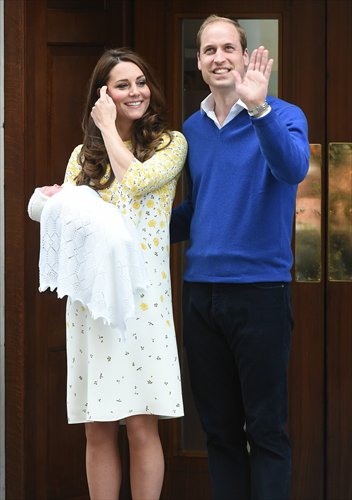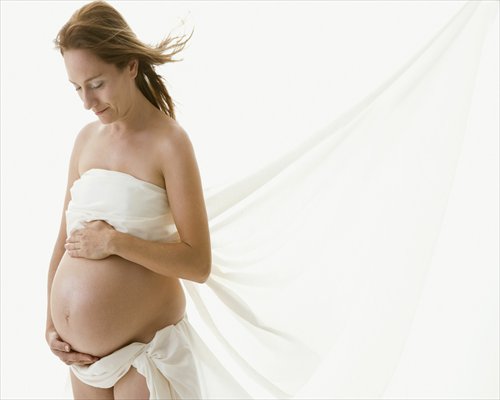Living up to a royal superwoman
Kate Middleton’s quick public appearance sparks debate in China

The Duke and Duchess of Cambridge leave the London Wing of St. Marys Hospital with their new baby daughter. Photo: CFP
Photo: IC
While people in the UK were celebrating the birth of the nation's second royal baby, the public in China fell into an online discussion about China's postnatal care tradition.
"Am I the only one who cannot stand up at all 10 hours after giving birth?" "This is the difference between physiques and different races." "She must be very sad because being a royal means you have no time to rest."
Although Chinese netizens posted various opinions after seeing Kate Middleton appear before the public just 10 hours after giving birth, they had one thing in common: They were shocked.
No celebrity in China would be willing to make a public appearance within the first month of their postnatal period, or even if they did so, they would at least be wearing a hat, a scarf and some warm clothing instead of high-heels and a short dress.
The no-nos of tradition
For hundreds of years, Chinese people have put their trust in the idea of zuoyuezi (sitting the month), a one-month period of time after giving birth in which new mothers follow certain restrictions such as not coming into contact with cold water, not going out if the weather is windy and not eating or drinking cold food or drinks.
The main purpose of sitting the month is to allow mothers to rest and stick to a healthy diet that can help recover lost qi and blood. Based on traditional Chinese medicine, pregnancy and delivery opens up the joints between bones therefore exposing them to cold air could cause arthritis in old age.
Thus, one of the most important principles for new mothers is to keep warm and reduce exercise as much as possible.
Restrictions can go as far as no showering, no brushing teeth and no outdoor exercise for a whole month. Chicken soup, pig's feet soup and eggs are the most recommended dishes. Few in China would be surprised to hear a new mother had eaten several dozen chickens and eggs during their first postnatal month. It may sound unbelievable for women living in modern cities but in some rural villages, such rules are still followed.
Nowadays, even though changing lifestyles mean a lot of new mothers are abandoning some of the stricter rules, people in China still see zuoyuezi as an important routine after labor. Older generations are firm believers in the benefits of this tradition, which means most parents, especially mothers, try their best to persuade their daughters to adhere to the rules.

Culture shock
Yang Liang, 34, just had her second child in the UK last year. For Yang, it was truly a shock back in 2010 when she gave birth to her first child in England.
"The woman next to me gave birth in the morning and just left the hospital in the afternoon carrying her baby in a basket. It was like she gave birth to an egg instead of a child," Yang told the Global Times.
In China, most hospitals keep a new mother and her baby for three days. In case of a C-section, mothers stay for about five days.
Yang was exhausted after her delivery and stayed the night at the hospital. At three a.m. she was woken up by the nurse and told that she needed to take her baby to another building for a health check as the boy's temperature was slightly higher than normal.
"I told the nurse I could barely stand and that my husband just lived nearby and he could come immediately. She didn't understand because in the UK women can easily return to their feet after delivery," Yang said, adding that she did what she was told to and next day she was exhausted and stayed in the hospital for a week.
Differences were not limited to the treatment of mothers. Yang told the Global Times that as she was not able to breastfeed her baby when she was sick, the hospital provided room-temperature milk for her to feed the baby.
"In March it is still cold in England. We obviously wouldn't give cold drinks to small children in China," said Yang.
Yang attributes the difference between the experience she had in the UK and what her counterparts experience in China to "different physical characteristics." A lot of Chinese netizens share a similar view, commenting that "any experienced mother would know the importance of zuoyuezi is not an exaggeration. Anyone can try the duchess's way but they are most likely to regret it later because Chinese people are not raised the same way as Westerners."
The explanation probably also provides a reason why postnatal care centers are becoming popular among Chinese in the US. Most Chinese people believe in the principles of Chinese medicine. Thus even after years spent living abroad they still follow the basic rules of what was passed down to them from older generations.
China is not the only place that follows the zuoyuezi tradition.
Lim So-yeon from Seoul, 31, has a one-year-old boy and is about to have her second baby at the end of 2015. She told the Global Times that in South Korea, the zuoyuezi period is two months. New mothers are told not to come into contact with cold water and the preferred menu every day for them is beef and kelp soup.
While no consensus has been reached on the zuoyuezi debate (to do it or not), individuals should choose whatever they feel the most comfortable with.